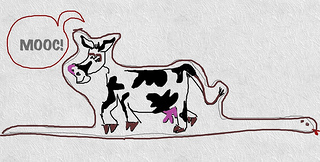MOOC, what’s in a name?
 After spending considerable time and effort on MOOCs in the past the Coursera / University of Edinburgh eLearning and Digital Culture MOOC (#edcmooc) was the first have been able to complete.
After spending considerable time and effort on MOOCs in the past the Coursera / University of Edinburgh eLearning and Digital Culture MOOC (#edcmooc) was the first have been able to complete.
How I did this was quite simple … I knew I’d fade out after a week or so so I set a goal of one blog entry per week’s activity, including a pre-MOOC post and post-MOOC ‘submission feedback’ post. Now I had set myself this public goal I needed to follow and live up to it. It worked. This may not be to everyone’s taste or motivational style, but after 3 other failed MOOCs I wanted to finish one, just one.
- MOOCs were also presented at the 2013 Blackboard Users Conference (#durbbu) by Jeremy Knox: MOOC Pedagogy
Which now brings me to the nature of the different MOOCs available. By now just about everyone knows what a MOOC is – if not there are plenty of excellent resources to help you on your favourite search engine. With more and more MOOCs available, and the organisations offering them increasing all the time, just what types of MOOCs are they, and what do they mean for the student?
- xMOOC is based on a model around a more traditional ‘teacher-student’ knowledge transfer and are offered by the large scale organisations like Udacity, Coursera, and edX.
- cMOOC is the ‘connectivist’ MOOC and have been referred to as a “chaotic experience” (Lugton, 2012) or “discursive communities creating knowledge together, inspired by George Siemens.” (Hoyle, 2012).
The difference between these two types of MOOCs is defined as:
“cMOOCs focus on knowledge creation and generation whereas xMOOCs focus on knowledge duplication” (Siemens, 2012), or
“in an xMOOC you watch videos, in a cMOOC you make videos.” (Smithers, 2012)
Here’s a question for you … how does the newly created FutureLearn fit into this? I asked this question on Twitter and Pat Parslow summed up what I was already thinking – without seeing what they will deliver it’s hard to say.
@hopkinsdavid I suspect @Future_learn is more xMOOC than cMOOC, but not clear precisely what they'll be delivering yet, so can't be sure :-)
— PatParslow (@PatParslow) March 6, 2013
I’m going to a meeting soon to discuss MOOCs, possibly FutureLearn too, and what and how the University of Leicester is going to work in this environment, and I hope to
- understand what will be offered and how,
- try and be involved in what Leicester will offer, and
- get a fuller understanding of what it takes to design, implement, and run a MOOC.
Fingers crossed.
References:
Hoyle, M. A. 2012. Coursera, Pedagogy, and the two faces of MOOCs. E1n1vers. October 19, 2012. http://einiverse.eingang.org/2012/10/19/coursera-pedagogy-and-the-two-faces-of-moocs/
Lugton, M. 2012 What is a MOOC? Reflections and Contemplation. August 12, 2012. http://reflectionsandcontemplations.wordpress.com/2012/08/23/what-is-a-mooc-what-are-the-different-types-of-mooc-xmoocs-and-cmoocs/
Siemens, G. 2012. MOOCs are really a platform. Elearnspace: Learning, Networks, Knowledge, Technology, Community. July 25, 2012 http://www.elearnspace.org/blog/2012/07/25/moocs-are-really-a-platform/
Smithers, M. 2012. OH: in an xMOOC you watch videos, in a cMOOC you make videos [Twitter]. October 9, 2012. https://twitter.com/marksmithers/status/255562376659730434
Here are some further excellent resources to consider for MOOCs:
- Ignatia Inge de Ward: MOOCs change education, but jobs decline in a knowledge era
- Steve Wheeler: Running a MOOC
- Stephen Downes: The rise of MOOCs
- Debbie Morrison: A Tale of Two MOOCs @ Coursera: Divided by Pedagogy
- David Hopkins: What we’re learning from online education (video)
- Ignatia Inge de Ward: True history of MOOC with mixed panel by Steve Hargadon
- David Hopkins: What is a MOOC? (video)
- Jonathan Rees: Peer grading can’t work
- Carolyn Lewis: A break with tradition
Image: Die Bildungsschlange (CC BY-NC-SA 2.0)


















Great resource. I have many MOOC questions & concerns. I do believe in online learning. Cautiously. Interested in branding, IP & data use.
Thanks for choosing my graphics as a part of the oer-movement and discussions around mooc’s. #mmc13 #bildungsschlange